Cellular slime mold - Study guides, Class notes & Summaries
Looking for the best study guides, study notes and summaries about Cellular slime mold? On this page you'll find 61 study documents about Cellular slime mold.
All 61 results
Sort by
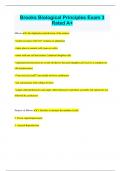
-
Brooks Biological Principles Exam 3 Rated A+
- Exam (elaborations) • 48 pages • 2024
-
- $11.99
- + learn more
Mitosis • the duplication and division of the nucleus • results in clones with *no* variation or adaptation • takes place in somatic cells (non-sex cells) • starts with one cell and creates 2 identical daughter cells • replicated chromosomes are evenly divided so that each daughter cell receives a complete set (46 chromosomes) • *can occur by itself*, but usually involves cytokinesis • not synonymous with cellular division • single-celled prokaryotes and single celled euk...
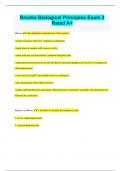
-
Brooks Biological Principles Exam 3 Rated A+
- Exam (elaborations) • 48 pages • 2024
- Available in package deal
-
- $11.99
- + learn more
Brooks Biological Principles Exam 3 Rated A+ Mitosis • the duplication and division of the nucleus • results in clones with *no* variation or adaptation • takes place in somatic cells (non-sex cells) • starts with one cell and creates 2 identical daughter cells • replicated chromosomes are evenly divided so that each daughter cell receives a complete set (46 chromosomes) • *can occur by itself*, but usually involves cytokinesis • not synonymous with cellular division ...
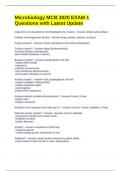
-
Microbiology MCB 3020 EXAM 1 Questions with Latest Update
- Exam (elaborations) • 19 pages • 2024
-
Available in package deal
-
- $16.49
- + learn more
organisms can classified by microbiologists into 2 parts: - Answer-cellular and acellular Cellular microorganisms include: - Answer-fungi, protists, bacteria, archaea Fungi contains? - Answer-Yeasts (unicellular) and mold (multicellular) Protists contain? - Answer-Algae (photosynthetic) Protozoa (hunters and grazers) Slime Molds (diseases in plants) Bacteria contain? - Answer-peptidoglycan cell wall -single celled usually -ubiquitous -extreme environments -lack membrane bound ...
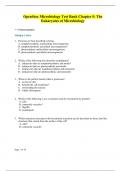
-
OpenStax Microbiology Test Bank Chapter 5: The Eukaryotes of Microbiology
- Exam (elaborations) • 14 pages • 2024
- Available in package deal
-
- $20.00
- + learn more
OpenStax Microbiology Test Bank Chapter 5: The Eukaryotes of Microbiology * = Correct answer Multiple Choice 1. Protozoa are best described as being: A. nonphotosynthetic multicellular microorganisms B. nonphotosynthetic unicellular microorganisms* C. photosynthetic multicellular microorganisms D. photosynthetic unicellular microorganisms 2. Which of the following best describes zooplankton? A. eukaryotes that are nonphotosynthetic and motile* B. eukaryotes that are photosynthet...

-
Brooks Biological Principles Exam 3 Questions and Answers
- Exam (elaborations) • 31 pages • 2024
- Available in package deal
-
- $13.49
- + learn more
Brooks Biological Principles Exam 3 Questions and Answers Mitosis - Answer- • the duplication and division of the nucleus • results in clones with *no* variation or adaptation • takes place in somatic cells (non-sex cells) • starts with one cell and creates 2 identical daughter cells • replicated chromosomes are evenly divided so that each daughter cell receives a complete set (46 chromosomes) • *can occur by itself*, but usually involves cytokinesis • not synonymous with ...
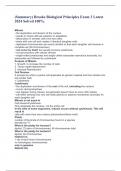
-
(Summary) Brooks Biological Principles Exam 3 Latest 2024 Solved 100%.
- Exam (elaborations) • 18 pages • 2024
-
- $12.49
- + learn more
(Summary) Brooks Biological Principles Exam 3 Latest 2024 Solved 100%. Mitosis • the duplication and division of the nucleus • results in clones with no variation or adaptation • takes place in somatic cells (non-sex cells) • starts with one cell and creates 2 identical daughter cells • replicated chromosomes are evenly divided so that each daughter cell receives a complete set (46 chromosomes) • can occur by itself, but usually involves cytokinesis • not synonymous wit...
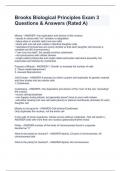
-
Brooks Biological Principles Exam 3 Questions & Answers (Rated A)
- Exam (elaborations) • 21 pages • 2024
- Available in package deal
-
- $10.99
- + learn more
Mitosis - ANSWER-• the duplication and division of the nucleus • results in clones with *no* variation or adaptation • takes place in somatic cells (non-sex cells) • starts with one cell and creates 2 identical daughter cells • replicated chromosomes are evenly divided so that each daughter cell receives a complete set (46 chromosomes) • *can occur by itself*, but usually involves cytokinesis • not synonymous with cellular division • single-celled prokaryotes and single c...
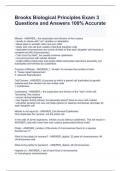
-
Brooks Biological Principles Exam 3 Questions and Answers 100% Accurate
- Exam (elaborations) • 20 pages • 2024
- Available in package deal
-
- $10.89
- + learn more
Mitosis - ANSWER_• the duplication and division of the nucleus • results in clones with *no* variation or adaptation • takes place in somatic cells (non-sex cells) • starts with one cell and creates 2 identical daughter cells • replicated chromosomes are evenly divided so that each daughter cell receives a complete set (46 chromosomes) • *can occur by itself*, but usually involves cytokinesis • not synonymous with cellular division • single-celled prokaryotes and single c...

-
Brooks Biological Principles Exam 3 Questions and Answers
- Exam (elaborations) • 31 pages • 2024
-
- $13.49
- + learn more
Brooks Biological Principles Exam 3 Questions and Answers Mitosis - Answer- • the duplication and division of the nucleus • results in clones with *no* variation or adaptation • takes place in somatic cells (non-sex cells) • starts with one cell and creates 2 identical daughter cells • replicated chromosomes are evenly divided so that each daughter cell receives a complete set (46 chromosomes) • *can occur by itself*, but usually involves cytokinesis • not synonymous with ...
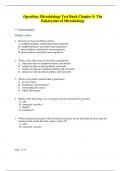
-
OpenStax Microbiology Test Bank Chapter 5: The Eukaryotes of Microbiology
- Exam (elaborations) • 14 pages • 2024
-
Available in package deal
-
- $20.00
- + learn more
OpenStax Microbiology Test Bank Chapter 5: The Eukaryotes of Microbiology * = Correct answer Multiple Choice 1. Protozoa are best described as being: A. nonphotosynthetic multicellular microorganisms B. nonphotosynthetic unicellular microorganisms* C. photosynthetic multicellular microorganisms D. photosynthetic unicellular microorganisms 2. Which of the following best describes zooplankton? A. eukaryotes that are nonphotosynthetic and motile* B. eukaryotes that are photosynthet...

Do you wonder why so many students wear nice clothes, have money to spare and enjoy tons of free time? Well, they sell on Stuvia! Imagine your study notes being downloaded a dozen times for $15 each. Every. Single. Day. Discover all about earning on Stuvia


